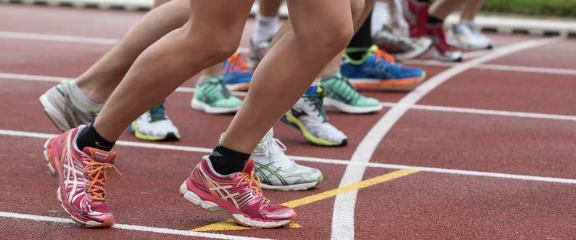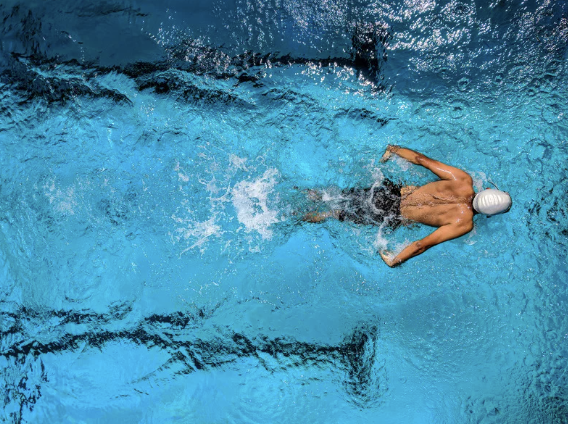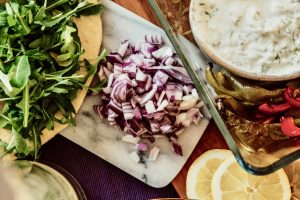The Vegetarian Athlete

By Joy Skipper
Registered Nutritional Therapist
Since the potential health benefits of a vegetarian diet have been of widely researched and heralded with regards to non-athletes, it may also be relevant to consider the effects of a vegetarian diet with regards to the athlete, and whether performance can be improved, or even compromised in any way?
According to the American Dietetic Association (ADA), vegetarian diets are nutritionally adequate for all stages of life and for athletes. Positive health effects have been reported in association with vegetarian diets, including reduced risk for obesity, type 2 diabetes, hypertension, cardiovascular disease and some cancers. Although whether this is due to the consumption of a plant-based diet or other lifestyle factors associated with vegetarianism is difficult to say.
The avoidance of meat and other animal products alone does not explain these health benefits. Individuals who self-identify as vegetarian can range from those who exclude or rarely eat red meat, to those who avoid any products containing ingredients derived from animal sources (see table below).
| Type of Vegetarian Diet | Definition |
| Vegan | Avoids all animal-derived foods (including milk, other dairy products, eggs, meat, poultry, fish and other seafood) |
| Macrobiotic | Avoids most animal-derived foods and emphasizes unprocessed organic foods |
| Ovovegetarian/lactovegetarian | Ovovegetarians include eggs but avoid milk and other dairy products, meat, poultry, fish and other seafood. Lactovegetarians include dairy products but exclude eggs and other animal-derived products |
| Fruitarian | Diet consists of raw or dried fruits, nuts, seeds, honey and vegetable oil |
| Lacto-ovo-vegetarian | Includes milk, other dairy products, and eggs; avoids meat, poultry, fish and other seafood |
| Semivegetarian | Avoids some, but not all, animal-derived foods (e.g., meat, poultry, fish, eggs and dairy products. Most often red meats are avoided or consumed in a limited amount |
Present day vegetarian athletes, such as cyclist Lizzie Armistead and Ironman triathlete Brendan Brazier provide evidence that high-level athletic performance can be achieved without consuming animal products, although it is difficult to collect dietary information on elite-level vegetarian athletes due to such a small number choosing a vegetarian diet.
Nutritional Considerations for Vegetarian Athletes
PROTEIN
With adequate energy and carbohydrate intake, low to moderate intensity endurance activity has little impact on dietary protein requirements, and 1g/kg/d is sufficient for athletes training at this level. The only situation where dietary requirements exceed those for relatively sedentary individuals is in top sport athletes. Several investigations have suggested that physical activity increases protein requirements to different extents depending on the type and amount of activity.
Concern has been raised in the past regarding vegetarian athletes, in particular vegan athletes, to meet the daily protein requirement through plant-based foods. Plant food sources of protein often contain low levels of one of the essential amino acids lysine, threonine, tryptophan or sulfur-containing amino acids, and may have low digestibility compared to animal sources of protein. But more recently studies have shown that plant proteins can be served as a complete source of amino acids, providing that a variety of foods are consumed throughout each day (it is not necessary to combine them at every meal).
| Protein Source | Lysine | Threonine | Tryptophan | Sulfur containing |
| Mg/g protein | ||||
| Pattern | 51 | 27 | 7 | 25 |
| Beef | 83 | 44 | 11 | 37 |
| Egg | 70 | 49 | 16 | 56 |
| Wheat | 28 | 30 | 13 | 39 |
| Brown rice | 38 | 37 | 13 | 35 |
| Almonds | 29 | 32 | 15 | 25 |
| Chickpeas | 67 | 37 | 10 | 28 |
| Soybeans | 63 | 41 | 14 | 28 |
Research is consistent in reporting that vegetarians’ protein intakes are lower than those of omnivores, however, protein intakes are general well above the recommended daily allowance in both groups.
CREATINE
Creatine is a nitrogen-containing compound found in meat, fish and poultry that can also be synthesized from arginine, glycine and methionine. A large majority of creatine is found in muscle and is used to fuel muscle contraction.
Research has been carried out to assess the possibility that creatine could function as an ergogenic aid, but there is lots of inconsistency with regards to the variable levels of muscle creatine i.e. those people with lower basal levels that supplement with creatine may see benefits whereas previous higher levels may not – the greater the change in muscle creatine level, the greater the increase in lean mass and performance. This obviously affects vegetarians (as their basal levels are naturally lower), and studies have shown that when vegetarians with low levels of muscle creatine use a creatine supplement there is an improvement in performance. This relates to vegetarian athletes who participate in sports that rely on the ATP-phosphocreatine system.

CARBOHYDRATES
Concerns have been raised that an emphasis on plant foods to enhance carbohydrate intake and optimize glycogen stores may lead to increases in dietary fibre and phytic acid intake to concentrations that reduce the bioavailability of several nutrients, including zinc, iron and some other trace minerals. However, with the plant-based diet containing a greater proportion of energy from carbohydrates, it could benefit those athletes involved in endurance sports, such as long-distance running.
IRON
Since iron plays a critical role in oxidative energy metabolism, it is essential for athletes to have adequate iron stores. Athletes, and in particular, female athletes, are at greater risk of low iron stores
that non-athletes. Iron requirements are usually higher in athletes, especially endurance and adolescent athletes, and it is still unclear whether a vegetarian diet can provide enough bioavailable iron. Studies have demonstrated that the total iron intake of vegetarians is similar to or greater than that of non-vegetarians, however, total iron intakes does not indicate the amount of absorbed iron.
Regardless of the cause, iron deficiency is an undesirable condition for athletes as iron plays a vital role in energy production. Iron occurs in foods as either haem or non-haem. Haem iron represents about 40% of the iron in meat, fish and poultry. Non-haem iron is also found in smaller quantities in meat, fish and poultry and is the iron found in plant-based foods. By definition, vegetarian diets contain no haem iron. Vegan and lacto-ovo- vegetarian diets rely predominantly on non-haem iron sources, such as milk and other dairy products.
Absorption of non-haem iron from plant foods is poor (2%-20%) compared to absorption of haem iron from animal foods (15%-35%). And in a vegetarian diet the abundance of naturally occurring iron inhibitors in plant foods, such as phyates (in wholegrains, legumes, lentils and nuts), polyphenols (in tea, coffee, red wines and certain vegetables) and tannins (in tea, coffee, chocolate, red wine), may further inhibit iron absorption. However, on the plus side, vegetarian diets are normally higher in vitamin C and citric acid which helps negate the effects of iron inhibitors and increases absorption of non- haem iron from food.

CALCIUM
Apart from dairy products, relatively few foods provide concentrated sources of calcium. And a purely vegan diet may also be low in vitamin D, which may further impair calcium absorption. As mentioned previously with iron, the presence of phytates and oxalates in plant foods also reduces the bioavailability of calcium.
Calcium-rich plant foods such as spinach and rhubarb also have high oxalate contents and provide negligible absorbable calcium. Low oxalate vegetables such as broccoli, and kale can provide rich sources of calcium. And more recently, calcium-fortified soy milk and yoghurts have been made available. Another good source is soybean curd (tofu) if it is made with calcium carbonate (check the label).
B12
B12 is an essential, water-soluble vitamin that is critical for general health, and deficiencies can lead to many complications and health related issues. Dairy products and eggs provide sufficient vitamin B12 for lacto-ovo-vegetarians, but vegans or those on very restricted vegetarian diets may be deficient in B12, as active B12 is found exclusively in animal products. No active B12 is found in any plant food. Those athletes on a very restricted diet should include soya milk fortified with B12 or consider supplementation rather risk the possibility of deficiency.

SUMMARY
Little data exists that looks at the relationship between athleticism and vegetarian diets, in spite of the popular belief that a vegetarian diet may be beneficial to some athletes, although lots of anecdotal reports abound. More long-term studies are needed to answer the concerns of vegetarian athletes, especially with regards to hormonal alterations and their impact on bone health (more relevant in female athletes).
Although some concerns have also been raised about the nutrient status of vegetarian athletes, a varied and well-planned vegetarian diet that is rich in a variety of foods, ensures energy intake is adequate, and includes appropriate supplementation where needed, should be compatible with successful athletic performance.
BOOK A CALL WITH OUR FRIENDLY ASSESSMENT TEAM
Please check Our Fees page before booking a call.
Choose a day and time that works for you.
Tell us what is going on for you.
Let us explain how we can help.
ONLINE NUTRITIONIST COACHING
Learn more about Health and Wellbeing
Here are some articles and blogs about health and wellbeing



